GUEST EDITOR
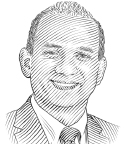
Jame Abraham, MD, FACP
Dr. Abraham is the Director of the Breast Oncology Program at Taussig Cancer Institute, and Professor of Medicine, Lerner College of Medicine, Cleveland Clinic.
For this installment in the Living a Full Life series of articles, Andrew D. Seidman, MD, of Memorial Sloan Kettering Cancer Center (MSK), was interviewed by Guest Editor Jame Abraham, MD, FACP. Dr. Seidman is a nationally recognized breast cancer expert in the management of both early-stage and advanced breast cancer. His research interests include the clinical investigation of novel chemotherapeutic and targeted agents in the treatment of metastatic breast cancer.
ANDREW D. SEIDMAN, MD
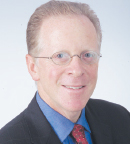
Affiliation: Medical oncologist, Memorial Sloan Kettering Cancer Center, New York
Favorite hobby: Bicycling. “When I clipped into the pedals for the first time, it was the new beginning of my passion to ride. It was an unbelievable sense of freedom.”
Worthy mentor: “I consider Larry Norton as my oncology father. His pearls of wisdom over the years have greatly enhanced my career and my own skills as a mentor.”
Newest interest: “Over the past few months, I’ve taken up baking as a hobby. I recently baked a birthday cake for my daughter, which came out quite good.”
A Young Cyclist
Long Island, New York, stretches about 115 miles eastward from New York Harbor to the fishing village of Montauk Point, situated on the lip of the Atlantic Ocean. Although densely populated, Long Island’s shorelines and semirural areas offer plenty of opportunity for outdoor activities and sports, such as cycling, which has been a life-long passion for Andrew D. Seidman, MD, who grew up in the historic hamlet of Old Bethpage, a place that hosts Revolutionary War reenactments.
After receiving his bachelor’s degree from Binghamton University in upstate New York, Dr. Seidman entered Hahnemann University School of Medicine in Philadelphia. After receiving his medical degree, Dr. Seidman did an internal medicine residency at Pennsylvania Hospital and an oncology/hematology fellowship at MSK, where he remains to this day. In 2003, Dr. Seidman received the Gay Clark Stoddard Memorial Award, conferred by the Komen Foundation to a health-care professional who consistently provides exceptional and compassionate care to patients with breast cancer. And in 2013, he received ASCO’s Career Development Award for his research on the role of taxanes in breast cancer treatment.
Why Oncology?
Dr. SEIDMAN was asked whether there was a special incident that sparked his desire to become an oncologist. “I’m not sure if there was a special incident about my choice to become an oncologist, other than my late father’s reaction when I told him I was going to do a fellowship in oncology. Of course, he was proud I was becoming a doctor, but he was concerned that oncology would be a depressing field for me. But the experiences I had with cancer patients when I was first decided on my specialty are still the things that continue to sustain me.”
Dr. Seidman recollected a house call he made to a very sick patient. “There’s so much I get back from my patients on a daily basis, that it is truly humbling. Over the years, on occasion, I’ve made house calls to patients when they were no longer able to make it to the clinic. My nurse and I visited a patient on Staten Island who was dying of liver metastases. We went into her bedroom and before I could get settled in, she wanted to know if her family had put out a spread of snacks for us. Here she was, facing her own death, and she was worried about us. Experiences like that are what make this such an incredible profession,” shared Dr. Seidman.
It Takes a Village
Dr. Abraham asked how Dr. Seidman balanced all of his demanding clinical, research, and educational travel activities. He replied: “In terms of balancing the demands of an academic career, which entails caring for patients, being a trialist, and presenting at various oncology meetings, the simple answer to that is that it takes a village, and I’m fortunate enough to be part of one. In fact, I’ve always told my patients that my support team is what makes me look good.” While discussing the value of having a tight-knit care-delivery unit, Dr. Seidman mentioned he’d just taken his team out for a holiday party, a retro night of bowling, and, with care, he named each one, detailing his or her specific contribution to the care model.
Dr. Seidman stressed that one of the special aspects of his career at MSK is there is no typical day. “On Mondays, I’m usually devoted to seeing outpatients in my clinic. Other days are a mixture of all my various activities in the clinic or research lab. I also lecture and teach. One recent thing I really enjoyed was serving as Associate Chair for Promotions and Appointments within the Department of Medicine here at MSK. It’s a role I’ve taken on to help promote faculty and prepare them for promotions. I think of this as the People magazine job at MSK, because it allows me a glimpse into the lives of my colleagues that others aren’t afforded. And it made me realize what an amazingly talented group of people we have at MSK,” said Dr. Seidman.
Watson and Mentoring
Another relatively new addition to Dr. -Seidman’s busy life at MSK is working with IBM’s Watson computer. “I’ve been working with a team from MSK and IBM to develop a computer-based oncology decision-support tool. It’s really novel and exciting, and as I get older, I just want to exercise different parts of my brain so I don’t get stale.”
In terms of balancing the demands of an academic career, … it takes a village, and I’m fortunate enough to be part of one. In fact, I’ve always told my patients that my support team is what makes me look good.— Andrew D. Seidman, MD
Tweet this quote
Stress and burnout within the oncology community are well documented, so do emerging technologies add to or decrease stress? “I firmly believe new technologies are going to decrease our stress. Many of us are overly burdened by mechanical rote activities, such as completing electronic documentation. And one of the more stressful aspects of our profession is the pressure we put on ourselves to make sure we’re making the best clinical decision possible for our patients. For me, the ability to leverage an artificial intelligence program to help me make that decision, gives me more time with the human aspects of patient care, which is what being a doctor is all about,” said Dr. Seidman.
Dr. Seidman spoke at length about the joy and reward he gets from mentoring young fellows, so they can move the field forward. Asked about mentors who have helped his own journey in oncology, Dr. Seidman said: “I consider Larry Norton as my oncology father. His pearls of wisdom over the years have greatly enhanced my career and my own skills as a mentor.”
Take Care of Yourself, Too
Dr. Seidman noted that over the course of his career, he learned that to take proper care of his patients, he needed to take care of himself. “I can’t stress enough the importance for our colleagues in oncology to find a way to take care of themselves and recharge their batteries. It will make them happier people and better doctors.”
He continued: “My longest-lasting passion has been hopping on a bicycle and riding, whether by myself or now more commonly with a group of friends. When I was young, a bicycle gave me freedom. I was able to ride to other towns and visit friends. As I got older, I’d ride out to the Hamptons and Montauk Point. Cycling was something special that carried me through high school, college, and medical school. I actually got my first serious bike when I was about 40 years old. When I clipped into the pedals for the first time, it was the new beginning of my passion to ride. It was an unbelievable sense of freedom.”
Asked to describe the personal pleasure and freedom he derives from cycling, Dr. Seidman said: “Most of the time when I’m on the bike, I have a destination in mind, but sometimes I’ll come to a country road and take it, just to see where I end up. But when I’m riding in traffic in Manhattan, it frees my mind up in a different way because a lot of city biking is being tightly focused on simply -staying alive. A lot of people are intimidated by biking in heavy city traffic, but for me it’s almost like I’m playing a video game, which takes me out of my own head, which is a good thing now and then.”
“Whether your primary focus in oncology is on patient care or research or both, it can become all-consuming, and I think most of us tend to be type A personalities and feel if we’re not working 24-7, it leaves us feeling inadequate.” he continued. “But we need to realize that if we are going to be at our best over the decades of our career, we need to evolve as humans, too. And that means caring for ourselves—physically and spiritually,” said Dr. Seidman.
A Country House
Aside from being an avid cyclist, Dr. Seidman also travels out West to Utah or Idaho for a yearly skiing trip with life-long friends, usually on the weekend of the Super Bowl. He is a firm believer in constantly seeking out new ways to challenge and invigorate himself. Yet those needed respites from the busy clinic don’t always come from cycling or slashing down the slopes of Sun Valley, they come close to home, also.
“There’s simple comfort in returning home after a long day at MSK and sitting down with my wife and talking about our day. And over the past few months I’ve taken up baking as a hobby. My wife’s a great cook, but she has no interest in baking, so I figured it was sort of a carve-out area for me. I recently baked a birthday cake for my daughter, which came out quite good,” admitted Dr. Seidman.
The Seidmans also have a country house on three wooded acres on a small mountain in Kent, Connecticut, a secluded place where Dr. Seidman loves to garden or, as his wife calls it, “padiddle” and do rugged outdoor work, such as clearing dense brush with a chainsaw. When Dr. Abraham remarked with wonder about the image of a noted oncologist wielding a chainsaw in the woods on a mountain, Dr. Seidman replied with typical humor, “Well, I haven’t lost any fingers yet.” ■
DISCLOSURE: Drs. Abraham and Seidman reported no conflicts of interest.
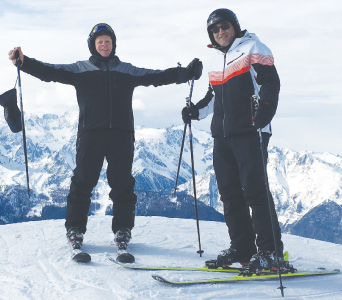
The annual “male-bonding” ski trip
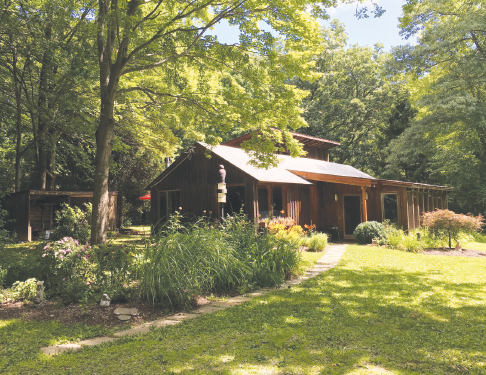
House and garden in Kent, Connecticut
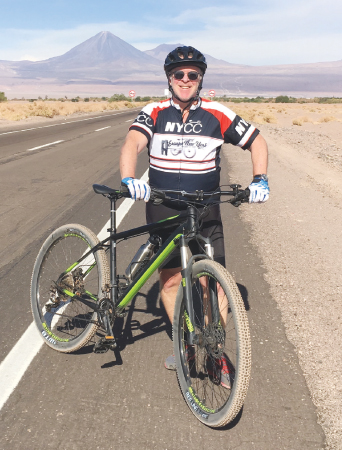
A life-long passion for cycling
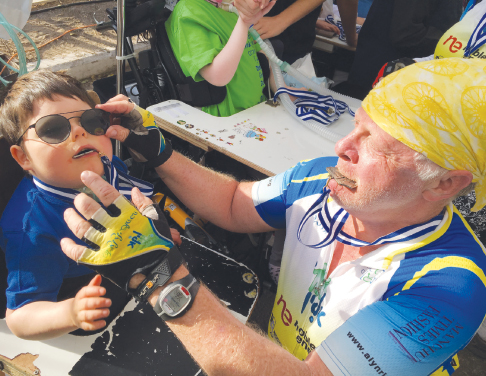
With one the special children of ALYN Hospital after the Wheels Of Love ride in Israel’s Negev, 2016
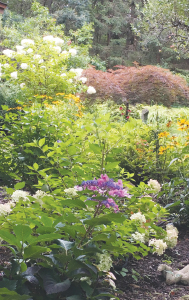
Garden in Kent
Living a Full Life: Let Us Hear From You
We encourage you to contact us if you would like to be interviewed about your own experiences and interests or would like to nominate a candidate. We are seeking to learn what motivates and inspires you and how you manage to achieve balance in your own life.
Write to editor@ASCOPost.com and reference Living a Full Life.

